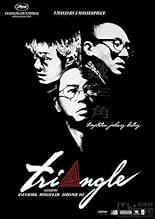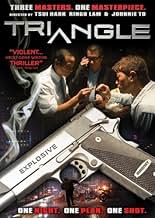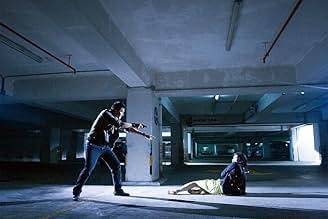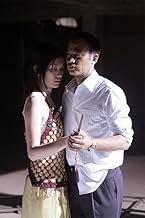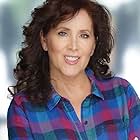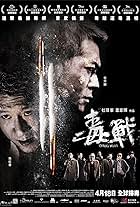IMDb RATING
6.2/10
1.9K
YOUR RATING
Told in three 30-minute segments, three friends seek out the buried treasure of a mysterious stranger.Told in three 30-minute segments, three friends seek out the buried treasure of a mysterious stranger.Told in three 30-minute segments, three friends seek out the buried treasure of a mysterious stranger.
- Awards
- 2 wins & 1 nomination total
Honglei Sun
- Mok Chung Yuan
- (as Sun Hong Lei)
Ka-Tung Lam
- Wen
- (as Lam Ka Tung)
Kai Wa Chan
- Kwan
- (as Chan Kai Wa)
Chun Yip
- Chan Fok-sui
- (as Yip Chun)
Libby Brien
- Fai's Mother
- (English version)
- (voice)
- …
Philip Hersh
- Wen
- (English version)
- (voice)
Chi-Shing Chiu
- Mob Boss
- (uncredited)
Featured reviews
A novel idea, originating in Tsui Hark I believe, to make a film based on the old game of incremental story-telling, passing the baton between 3 of Hong Kong's (once) top directors (they should have swapped Johnnie To for John Woo and called it "The Victims of Jean-Claude Van-Damme Rehabilitation Project"). The result is, sadly, almost as incoherent as a nay-sayer might expect it to be.
The first third of the film (Tsui) is kind of scatter-shot, throwing ideas out there for the other directors to pick up on, centred around a heist movie setup with 3 main protagonists (Simon Yam, Louis Koo and Sun Hong-Lei) - setting up a triangle that clearly hints where he really wants the movie to go. This section does suffer from that amphetamine-high lack of focus that sometimes afflicts Tsui Hark when he has too many ideas for a movie, and can't decide which ones are really important.
Ringo Lam takes over just before 30 minutes in, and the mood shifts - he evidently wants to create a psychological horror instead of a crime movie, and shifts the focus more to the characters played by Kelly Lin and Gordon Lam. This part is eerie and oblique, a little surreal at times but much more focused.
Then Johnnie To comes in for the final act, and decides that the film should really be... a farce! Perhaps it's his way of commenting on the baby he has been left holding. Every character that's been introduced so far is brought back into play, along with a couple of new ones (notably Lam Suet), and the plot plays itself out in an elaborate comedy of errors hinged upon a series of entirely implausible coincidences. The finale is a gun battle vaguely reminiscent of those in THE MISSION or EXODUS, but with a more comical coating. It's a bit Shakespearean, but falls short of The Bard's wit.
The shifting of tones, and the diverting focus of the narrative, is exactly the sort of problem you'd expect a movie with three directors and three script-writing teams to have. Perhaps that was the point, and each director deliberately took the movie into their own favourite territory when they took the reins. I guess that's how it usually happens when people play the game amongst themselves (I forget the name of it, never really saw the appeal), but they perhaps failed to factor in that the game is more fun for the people playing it than for somebody who simply gets handed the end result. The production process may be interesting to talk or think about, but probably makes for a less enjoyable film than a more conventional collaboration would have.
I did enjoy Ringo Lam's section though - hopefully it's a sign he's going to be doing more work in Hong Kong again!
The first third of the film (Tsui) is kind of scatter-shot, throwing ideas out there for the other directors to pick up on, centred around a heist movie setup with 3 main protagonists (Simon Yam, Louis Koo and Sun Hong-Lei) - setting up a triangle that clearly hints where he really wants the movie to go. This section does suffer from that amphetamine-high lack of focus that sometimes afflicts Tsui Hark when he has too many ideas for a movie, and can't decide which ones are really important.
Ringo Lam takes over just before 30 minutes in, and the mood shifts - he evidently wants to create a psychological horror instead of a crime movie, and shifts the focus more to the characters played by Kelly Lin and Gordon Lam. This part is eerie and oblique, a little surreal at times but much more focused.
Then Johnnie To comes in for the final act, and decides that the film should really be... a farce! Perhaps it's his way of commenting on the baby he has been left holding. Every character that's been introduced so far is brought back into play, along with a couple of new ones (notably Lam Suet), and the plot plays itself out in an elaborate comedy of errors hinged upon a series of entirely implausible coincidences. The finale is a gun battle vaguely reminiscent of those in THE MISSION or EXODUS, but with a more comical coating. It's a bit Shakespearean, but falls short of The Bard's wit.
The shifting of tones, and the diverting focus of the narrative, is exactly the sort of problem you'd expect a movie with three directors and three script-writing teams to have. Perhaps that was the point, and each director deliberately took the movie into their own favourite territory when they took the reins. I guess that's how it usually happens when people play the game amongst themselves (I forget the name of it, never really saw the appeal), but they perhaps failed to factor in that the game is more fun for the people playing it than for somebody who simply gets handed the end result. The production process may be interesting to talk or think about, but probably makes for a less enjoyable film than a more conventional collaboration would have.
I did enjoy Ringo Lam's section though - hopefully it's a sign he's going to be doing more work in Hong Kong again!
If a movie can't hold your interest in the first 25 minutes, it's over as far as I'm concerned. This concept that you have to simply deal with a slow first third of a movie and be rewarded later is nonsense. A good movie has to start and end strong. It all seem interesting and some decent shots and lots of promise, but ultimately muddled and irrelevant. There are so many other movies from Asia to watch, many of which I am sure most of you have not seen, that I would really skip this one and look elsewhere. Why exactly does IMDb require a 10 line minimum for reviews? I said my piece and I hope this helps a few of you move on to the next film.
Fear not: the juicy premise of putting three masters of HK violent cinema in one movie delivers one of the most entertaining action movies of 2007.
The film is a palpable thrill-ride, with an air of unmistakable cool and sheer brassiness of style. With scarcely time to slow-down, the silly and initially confusing but heavily entertaining and ultimately straightforward plot runs through a hundred twists and turns on its way to the seat-gripping finale that is the last third of the film.
The three segments directed by Tsui Hark, Ringo Lam and Johnny To (apparently in that order, although it was not indicated in the film) are distinct in style and mannerism, but near-seamlessly integrated into a single experience. Not only did they use three directors, they also used multiple script-writers. Do not expect any section-markers here, though: it is not three stories, but one story told in three consecutively more elaborate segments which represent the vision and prowess of one director each - without, however, appearing needlessly patched-together or unfocused. So, to compare this to that other Asian 3-in-1 package, the excellent Three Extremes (with Takashi Miike, Fruit Chan and Park Chan-Wook), is to miss the point. Here we are dealing with a unitary experience, one not divisible by three.
Fans of each director will find much to comment on the stylistic differences between each section. Best known perhaps for his kung-fu productions (at least in the West), the multi-talented Tsui Hark delivers a cool, crafty ambiance in his piece. Ringo Lam, a long-line police action-drama director, likewise carries the torch with a surprisingly mellow and tactful show-of-hands. It is really the last segment of the film, under the steady hand of the miracle-worker Johnny To - the brilliant director of gems such as Election I & II and Exiled - that really puts this work in the category of must-see cinema. It would be impossible to describe just what makes the last act so good without giving something away, but suffice to say the success lies in its mixture of suspense, action and black humour in a dazzling tour-de-force. And yet, To's section makes sense only in the context of the whole; it would not be possible to appreciate the finale without going through the first and second acts. The third act is the charm, but only because the first two acts lead to it and suggest it with force and clarity. By its combination of three geniuses, the impeccable thrill of the film gets multiplied by three, making the end result something greater than the sum of its parts.
The actors are adequate and the chemistry between them works well. This is not an especially 'deep' thinking-man's movie by any stretch - character-development especially is among the real weaknesses of this movie - but for what it's worth, the characters deliver their lines and express their emotional range quite convincingly (with a few notable exceptions). The fraternal chemistry between the main characters saves much of the hapless script. But really, this film is about action, violence, crime, morality and love - the stuff of entertainment. Maybe not serious or tight enough for some, the over-the-top story proves highly entertaining as a backdrop for the stylish visual work emanating from the three great directors.
I'm willing to forgive this movie its obvious shortcomings: its unexplained plot-ends and side-tracks, its focus on action and shine over drama and substance, its use of three writers in the seemingly impossible task of writing a single storyline. Bottomline: It works! Sometimes heckling about details seems petty when what is iffy in ideation is saved in execution. Minor script is turned into a major movie.
Absolute entertainment, with a touch - or two, or three - of genius.
The film is a palpable thrill-ride, with an air of unmistakable cool and sheer brassiness of style. With scarcely time to slow-down, the silly and initially confusing but heavily entertaining and ultimately straightforward plot runs through a hundred twists and turns on its way to the seat-gripping finale that is the last third of the film.
The three segments directed by Tsui Hark, Ringo Lam and Johnny To (apparently in that order, although it was not indicated in the film) are distinct in style and mannerism, but near-seamlessly integrated into a single experience. Not only did they use three directors, they also used multiple script-writers. Do not expect any section-markers here, though: it is not three stories, but one story told in three consecutively more elaborate segments which represent the vision and prowess of one director each - without, however, appearing needlessly patched-together or unfocused. So, to compare this to that other Asian 3-in-1 package, the excellent Three Extremes (with Takashi Miike, Fruit Chan and Park Chan-Wook), is to miss the point. Here we are dealing with a unitary experience, one not divisible by three.
Fans of each director will find much to comment on the stylistic differences between each section. Best known perhaps for his kung-fu productions (at least in the West), the multi-talented Tsui Hark delivers a cool, crafty ambiance in his piece. Ringo Lam, a long-line police action-drama director, likewise carries the torch with a surprisingly mellow and tactful show-of-hands. It is really the last segment of the film, under the steady hand of the miracle-worker Johnny To - the brilliant director of gems such as Election I & II and Exiled - that really puts this work in the category of must-see cinema. It would be impossible to describe just what makes the last act so good without giving something away, but suffice to say the success lies in its mixture of suspense, action and black humour in a dazzling tour-de-force. And yet, To's section makes sense only in the context of the whole; it would not be possible to appreciate the finale without going through the first and second acts. The third act is the charm, but only because the first two acts lead to it and suggest it with force and clarity. By its combination of three geniuses, the impeccable thrill of the film gets multiplied by three, making the end result something greater than the sum of its parts.
The actors are adequate and the chemistry between them works well. This is not an especially 'deep' thinking-man's movie by any stretch - character-development especially is among the real weaknesses of this movie - but for what it's worth, the characters deliver their lines and express their emotional range quite convincingly (with a few notable exceptions). The fraternal chemistry between the main characters saves much of the hapless script. But really, this film is about action, violence, crime, morality and love - the stuff of entertainment. Maybe not serious or tight enough for some, the over-the-top story proves highly entertaining as a backdrop for the stylish visual work emanating from the three great directors.
I'm willing to forgive this movie its obvious shortcomings: its unexplained plot-ends and side-tracks, its focus on action and shine over drama and substance, its use of three writers in the seemingly impossible task of writing a single storyline. Bottomline: It works! Sometimes heckling about details seems petty when what is iffy in ideation is saved in execution. Minor script is turned into a major movie.
Absolute entertainment, with a touch - or two, or three - of genius.
The idea behind this film was to get three of the best Hong Kong action/crime directors today working together. The result was each did one segment (around 30 minutes each) in chronological order with Tsui first, Lam second and To finishing it off. This would be done differently than a film like Four Rooms (1995) where each segment was basically a separate story. In this movie each director would continue after the other to move the story and characters along from what happened previously. Like many conceptual films this movie sometimes seems a bit forced, sometimes clunky, some plot angles hang, disappear and seem a bit confusing, but I still found the movie quite interesting and entertaining.
Triangle (the Chinese title is The Iron Triangle) starts off with Tsui Hark creating the foundation for the plot. It is both good and bad that Hark creates tons of plot angles for the movie to go. It gives the Ringo and later To plenty of room to move with, but also will leave either a bit too much to be either ignored and some angles barely gone over that a tighter script would have just ignored. In fact it took me a few tries to get past the beginning.
Simon Yam (PTU, Election) is Lee Bo Sam a former race driver who is friends with Fai (Louis Koo: Throwdown) and antique shop owner Mok Chung-yuan (Sun Hong Lei: Seven Swords). Fai is trying to get him to acquiesce to a driving job for a jewelry heist. If he does not Fai will receive harm from some local triad members. All three need money though. In the middle of the meeting between Fai and Lee a strange man gives those three a small gold piece and states where they can find the rest of this treasure. His motives for doing this are a mystery to the bunch. Meanwhile Lee's wife Lin (Kelly Lin: Sparrow) is having an affair with policeman Wen (Gordon Lam), states that her husband is trying to have her killed off and wants Lam to get rid of Sam first.
When Ringo Lam takes over in the first film he has directed since leaving the production of Wake of Death (2004), he ups the psychological attitude of the film and enriches the characterization. The most effective change is how the love-triangle relationship between Lam, Lin and Sam no longer appears to be the stereotypical triangle in the beginning and takes on a new bizarre dimension. Ringo Lam does a homage to Reservoir Dogs which was based on his film City on Fire so you see a homage to an homage) by using a record player, a handcuffed cop and a few other scenarios in this middle segment of the film.
The last segment belongs to Johnnie To and from the beginning where we see Lam Suet (Lam is in a lot of Johnnie To movies) we know who is directing this. Suet plays a drug addicted epileptic who causes flats in both automobiles and bikes and offers to fix them. The area where he is in has no cellular reception and a conveniently located eatery where they can wait while their vehicle is being fixed. However, Wen is there as well as the triad members who are there to purchase firearms. This is another use of the triangle in this film. To offers his normal use of "Team Spirit" themes and Mexican standoff action in this conflict triangle to make the last half hour quite interesting.
While this film never fully jells together, some plot changes are just a bit bizarre like Lin's character change (or really non-use) in the third segment, I still ended up really liking this film. There are quite enough brilliant moments that make this movie a recommendation for fans of not only Hong Kong cinema and Johnnie To, but movie fanatics as well. You just have to get past the first 15 minutes.
I have the Magnolia pictures R1 release that has two extra features: a "Making of" and a Behind the Scenes. The "Making of" is solely focused on Johnnie To's segment and ultimately not that interesting. It is mostly standing around, saying a few lines and more waiting. Behind the Scenes actually has the most information with interviews from several of the cast and crew. The region 3 release of this by Mega Star has deleted scenes, TV spots and trailers in addition to what the R1 has. I was most disappointed that the R1 does not have the deleted scenes, but it is still a worthwhile release.
Triangle (the Chinese title is The Iron Triangle) starts off with Tsui Hark creating the foundation for the plot. It is both good and bad that Hark creates tons of plot angles for the movie to go. It gives the Ringo and later To plenty of room to move with, but also will leave either a bit too much to be either ignored and some angles barely gone over that a tighter script would have just ignored. In fact it took me a few tries to get past the beginning.
Simon Yam (PTU, Election) is Lee Bo Sam a former race driver who is friends with Fai (Louis Koo: Throwdown) and antique shop owner Mok Chung-yuan (Sun Hong Lei: Seven Swords). Fai is trying to get him to acquiesce to a driving job for a jewelry heist. If he does not Fai will receive harm from some local triad members. All three need money though. In the middle of the meeting between Fai and Lee a strange man gives those three a small gold piece and states where they can find the rest of this treasure. His motives for doing this are a mystery to the bunch. Meanwhile Lee's wife Lin (Kelly Lin: Sparrow) is having an affair with policeman Wen (Gordon Lam), states that her husband is trying to have her killed off and wants Lam to get rid of Sam first.
When Ringo Lam takes over in the first film he has directed since leaving the production of Wake of Death (2004), he ups the psychological attitude of the film and enriches the characterization. The most effective change is how the love-triangle relationship between Lam, Lin and Sam no longer appears to be the stereotypical triangle in the beginning and takes on a new bizarre dimension. Ringo Lam does a homage to Reservoir Dogs which was based on his film City on Fire so you see a homage to an homage) by using a record player, a handcuffed cop and a few other scenarios in this middle segment of the film.
The last segment belongs to Johnnie To and from the beginning where we see Lam Suet (Lam is in a lot of Johnnie To movies) we know who is directing this. Suet plays a drug addicted epileptic who causes flats in both automobiles and bikes and offers to fix them. The area where he is in has no cellular reception and a conveniently located eatery where they can wait while their vehicle is being fixed. However, Wen is there as well as the triad members who are there to purchase firearms. This is another use of the triangle in this film. To offers his normal use of "Team Spirit" themes and Mexican standoff action in this conflict triangle to make the last half hour quite interesting.
While this film never fully jells together, some plot changes are just a bit bizarre like Lin's character change (or really non-use) in the third segment, I still ended up really liking this film. There are quite enough brilliant moments that make this movie a recommendation for fans of not only Hong Kong cinema and Johnnie To, but movie fanatics as well. You just have to get past the first 15 minutes.
I have the Magnolia pictures R1 release that has two extra features: a "Making of" and a Behind the Scenes. The "Making of" is solely focused on Johnnie To's segment and ultimately not that interesting. It is mostly standing around, saying a few lines and more waiting. Behind the Scenes actually has the most information with interviews from several of the cast and crew. The region 3 release of this by Mega Star has deleted scenes, TV spots and trailers in addition to what the R1 has. I was most disappointed that the R1 does not have the deleted scenes, but it is still a worthwhile release.
For a movie that has been put together by three of the heavyweight directors of Hong Kong cinema, you would expect nothing short of a masterpiece to be the end result. However, that was not really the case with "Triangle".
Don't get me wrong, I am not saying that "Triangle" is a bad or boring movie, far from it actually. The storyline in the movie is good and well put together, although it just tended to drag on in long sequences. There are far better movies available from the Hong Kong cinema compared to this one.
Aside from the three directors, then "Triangle" does have some rather good and established Hong Kong actors to the cast list; Louis Koo and Simon Yam really did carry the movie quite nicely.
There is a lot of action in the movie, which works out quite well, however the last part of the movie that takes place in a small outdoors food vendor in the nature (I assume this is somewhere in the New Territories) tended to become a little too much, especially because there was some comedy and humor attended to throw into that scene, which just ended up making the scene worse.
"Triangle" is a solid enough movie with good performances, however, I had just initially expected something extraordinary to come from a collaboration between Tsui Hark, Ringo Lam and Johnnie To.
Don't get me wrong, I am not saying that "Triangle" is a bad or boring movie, far from it actually. The storyline in the movie is good and well put together, although it just tended to drag on in long sequences. There are far better movies available from the Hong Kong cinema compared to this one.
Aside from the three directors, then "Triangle" does have some rather good and established Hong Kong actors to the cast list; Louis Koo and Simon Yam really did carry the movie quite nicely.
There is a lot of action in the movie, which works out quite well, however the last part of the movie that takes place in a small outdoors food vendor in the nature (I assume this is somewhere in the New Territories) tended to become a little too much, especially because there was some comedy and humor attended to throw into that scene, which just ended up making the scene worse.
"Triangle" is a solid enough movie with good performances, however, I had just initially expected something extraordinary to come from a collaboration between Tsui Hark, Ringo Lam and Johnnie To.
Storyline
Did you know
- TriviaAfter Tsui completed the first segment of Triangle, Lam looked at the development of it before shooting the second part, and handed the film to Johnnie To who completed the third part with its conclusion.
- SoundtracksLOVE IS LIKE A BALLOON
Performed by Xiu Qiong Pan
Composed by Yao Ming
Lyrics by Chen Di Yi
OP: EMI Music Publishing Hong Kong
Sound recording license courtesy of EMI Music Hong Kong
Details
- Release date
- Countries of origin
- Official sites
- Languages
- Also known as
- 鐵三角
- Filming locations
- Production companies
- See more company credits at IMDbPro
Box office
- Budget
- $5,000,000 (estimated)
- Gross worldwide
- $4,641,637
- Runtime1 hour 33 minutes
- Color
- Sound mix
- Aspect ratio
- 2.35 : 1
Contribute to this page
Suggest an edit or add missing content



